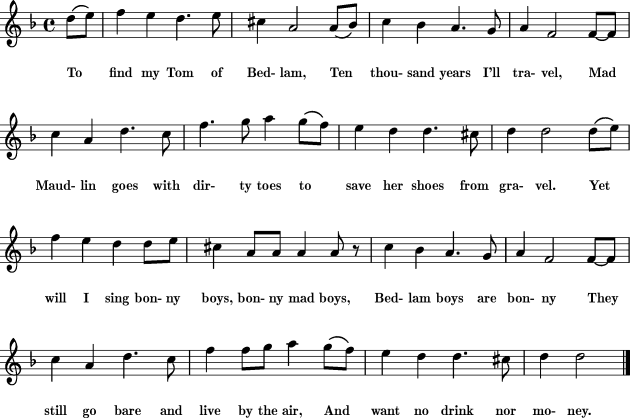Subject: RE: Help: BEDLAM BOYS
From: Joe Offer
Here's the entry from the Traditional Ballad Index. Apparently, the earliest known text of the song is in Pills to Purge Melancholy (1720) - is this the version we have in the Digital Tradition???
-Joe Offer-
Tom a Bedlam (Bedlam Boys)
DESCRIPTION: The singer is determined to find her Tom. She describes (his or her) visions. Chorus: "Still I sing bonny boys, bonny mad boys, Bedlam boys are bonny. For they all go bare, and they live by the air...."AUTHOR: unknown
EARLIEST DATE: 1720 (Pills to Purge Melancholy)
KEYWORDS: madness love separation
FOUND IN: Britain(England)
REFERENCES (4 citations):
Logan, pp. 172-189, "Tom a Bedlam" (there are eight texts in this section; the one labelled "Mad Maudlin" on pp. 181-182 is this one)
Chappell/Wooldridge I, pp. 175-178, "Tom a Bedlam" (7 fragmentary texts, at least one of which is this one; 1 tune; the next piece, "Gray's Inn Masque, or Mad Tom, or New Mad Tom of Bedlam," (for which see also BBI, ZN910, "Forth from my sad and darksome cell") appears to be an unrelated literary song, found also in Percy, pp. 344-347, "Old Tom of Bedlam," the first of six "Mad Songs")
DT, BEDLMBOY*
ADDITIONAL: Walter de la Mare, _Come Hither_, revised edition, 1928; #310, "Tom O'Bedlam" (1 text)
ST Log172 (Full)
CROSS-REFERENCES:
cf. "Nancy's Complaint in Bedlam" (theme)
NOTES: The Hospital of St. Mary of Bethlehem (Bedlam), in London, was the first hospital for insane men in England. Magdalene Hospital (Maudlin), mentioned in some versions of the song, was the first hospital for insane women. - PJS
"Bedlam songs" seem to have been a phenomenon in the eighteenth century and after. To make matters worse, they all seem to mix and match. Many of Percy's texts, e.g., resemble Logan's, which resemble Chappell's. It's very hard to tell them apart.
Under the circumstances, I've listed the most traditional-seeming of the bunch ("Tom a Bedlam") here, and hope cross-references in the "References" field will suffice for the others.
Aldington's The Viking Book of Poetry of the English-Speaking World we find a Tom o' Bedlams Song starting
From the hag and hungry goblin
That into rages would rend ye,
And the spirit that stands
By the naked man
In the book of moons defend ye....
It's not this piece (the chorus is different), but there is undeniable dependence. Aldington attributes the piece to Giles Earle (dates unknown but early seventeenth century). Granger's Index to Poetry, however, lists the author of this as unknown -- and it has plenty of supporting evidence, since it cites 18 different references. Nor does Granger's list any other works by this alleged Earle. - RBW
Last updated in version 2.6
File: Log172
Go to the Ballad Search form
Go to the Ballad Index Song List
Go to the Ballad Index Instructions
Go to the Ballad Index Bibliography or Discography
The Ballad Index Copyright 2016 by Robert B. Waltz and David G. Engle.
Here are the lyrics we have in the Digital Tradition:
BEDLAM BOYS
For to see Mad Tom of Bedlam
Ten thousand miles I traveled
Mad Maudlin goes on dirty toes
For to save her shoes from gravel.
Still I sing bonny boys, bonny mad boys
Bedlam boys are bonny
For they all go bare and they live by the air
And they want no drink or money.
I now repent that ever
Poor Tom was so disdain-ed
My wits are lost since him I crossed
Which makes me thus go chained
I went down to Satan's kitchen
For to get me food one morning
And there I got souls piping hot
All on the spit a-turning
There I took up a caldron
Where boiled ten thousand harlots
Though full of flame I drank the same
To the health of all such varlets
My staff has murdered giants
My bag a long knife carries
For to cut mince pies from children's thighs
And feed them to the fairies
The spirits white as lightening
Would on me travels guide me
The stars would shake and the moon would quake
Whenever they espied me
No gypsy, slut or doxy
Shall win my mad Tom from me
I'll weep all night, with stars I'll fight
The fray shall well become me
And when that I'll be murdering
The Man in the Moon to the powder
His staff I'll break, his dog I'll shake
And there'll howl no demon louder
So drink to Tom of Bedlam
Go fill the seas in barrels
I'll drink it all, well brewed with gall
And maudlin drunk I'll quarrel
For to see Mad Tom of Bedlam
Ten thousand years I have traveled
Mad Maudlin goes on dirty toes
For to save her shoes from gravel.
From Pills to Purge Melancholy Vol IV, D'Urfey (words and tune).
@madness
recorded by John and Tony on Dark Ships
filename[ BEDLMBOY
TUNE FILE: BEDLMBOY
CLICK TO PLAY
BR

Please note that the Digital Tradition lyrics are NOT the same as the version found in Pills to Purge Melancholy
-Joe-